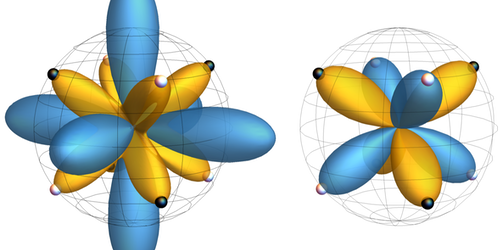Protecting Molecular Qubits from Noise
In recent years, researchers have made steady advances in quantum information processing and have started building simple quantum computers. To create more complex and sophisticated quantum computers, they need ways to control the interactions of large numbers of qubits and to protect the information these qubits encode from noise. Now, Victor Albert of the California Institute of Technology and colleagues have designed a method to protect quantum information that has been encoded in the rotational states of individual molecules [1]. Molecules are small compared to some other qubit candidates, so using them as qubits may offer an efficient route to creating quantum computers with a greater number of qubits than other approaches.
To use a molecule as a qubit, researchers must guard the molecule against two types of noise: shifts in the molecule’s orientation and changes in its angular momentum. In classical computers, which store information in bits whose states can be either 1 or 0, redundant encoding is often used to protect against noise. Through a combination of analytical calculations and computational modeling, Albert and colleagues designed an analogous redundant encoding scheme that protects molecular qubits from noise.
In classical computers, redundant encoding can involve using three physical bits (111 or 000), rather than just one, to represent the smallest unit of information. If that is done, a single flipped bit won’t result in a loss of information. In the quantum approach that Albert and colleagues propose, researchers would redundantly encode information in superpositions of each molecule’s orientation. To move toward a molecule-based quantum computer, researchers will next need to develop ways to make molecules interact with each other, i.e., process information, while in their encoded states, something Albert and his colleagues are looking into.
–Erika K. Carlson
Erika K. Carlson is a Corresponding Editor for Physics based in New York City.
References
- V. V. Albert et al., “Robust encoding of a qubit in a molecule,” Phys. Rev. X 10, 031050 (2020).




